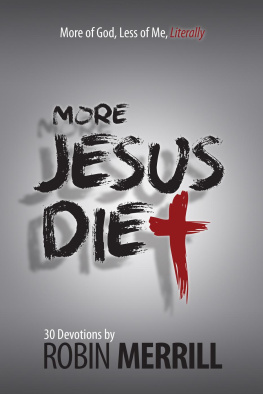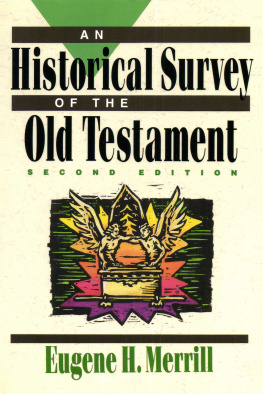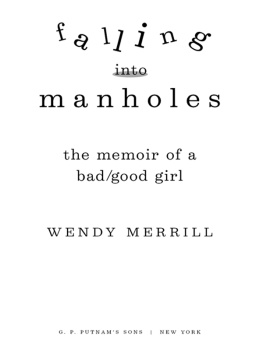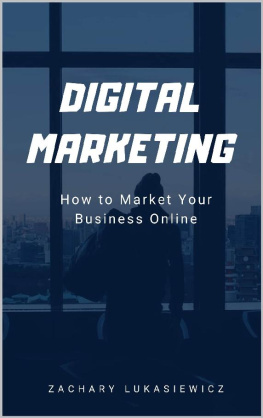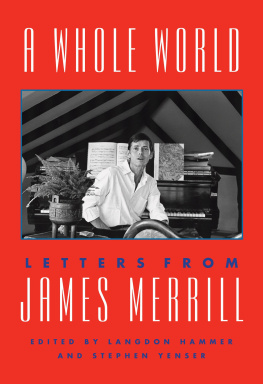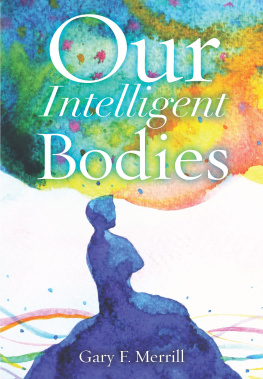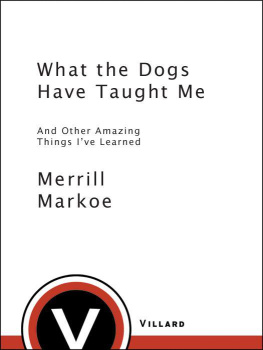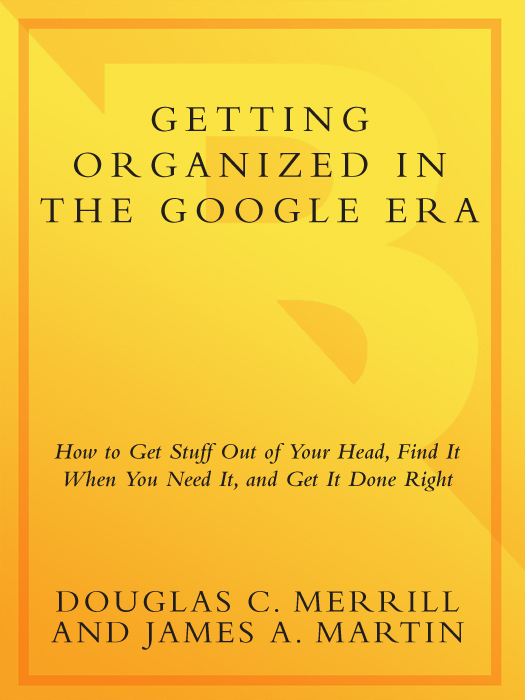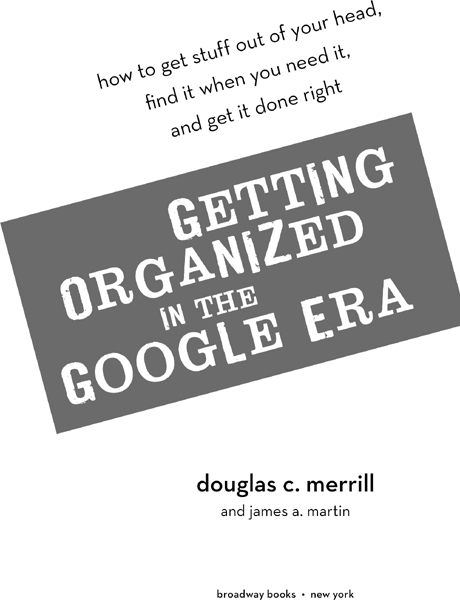CONTENTS
part one
Cocktail Parties & Capn Crunch
A Journey Inside Your Brain
Summer Vacations, Suburbia & Factory Shifts
Overcoming Organizational Challenges in a Disorganized World
Racecars, Basketball Shorts & Opera
Owning Up to Our Personal Constraints
Climb That Mountain or Chill in the Barcalounger?
The Importance of Having Clear Goals
part two
Beyond Taylorism & Trapper Keepers
Why Search Matters
Paris, France, or Paris, Vegas?
How to Master the Art of Search
Colored Markers & Filters
Making Information Stick
Day-Timer or Digital?
When, and When Not, to Go Paperless
Beyond Send & Receive
Turning Your E-mails into a Searchable History Thats All About You
Thanks for Sharing
Why You Should Keep Your Calendar in the Cloud
A Browser, an Operating System & Some Cool Stickers
Organizing Your Documents and Web Content
part three
Avoiding Brain Strain
Strategies for Minimizing Distractions and Staying Focused Throughout the Workday
Checking E-mail from the Beach
How to Integrate Work and Life
Epilogue
Dude! Just Turn Off Your Brain and Ski
PREFACE
W HAT? ANOTHER BOOK on organization? No way, youre probably thinking. I mean, does the world really need another book on how to get organized?
Its okay. I thought the same thing when I first began to write this book. At the time, I was the chief information officer at Google, whose corporate mission is to organize the worlds information.
So apparently there were people who thought I must have useful insights to share about the challenges of being organized in the information age.
Out of sheer politeness, I sat down with my colleague (and now most excellent coauthor) Jim Martin to talk about organization. As it turned out, I found I had plenty of new ideas to offer.
But first, please allow me a brief digression.
Picture, if you will, a small, thin young boy with a buzz cut and thick glasses. Hes seated next to his mother at a long, dark wooden table. The tables too high for him, so his legs dangle from his chair as he sits up as tall as he can. Its a summer afternoon during the 1970s in Conway, Arkansas, a small, bucolic town. Outside, its hazy-hot and stagnant; only the mosquitoes are moving. Inside, its cool, with the air conditioner humming in the background.
Second verse same as the first.
Hermans Hermits, Im Henry VIII, I Am
Despite the languid pace of this late summer afternoon in this quiet southern town, the boys pulse is racing.
His mother is patiently guiding her son through the multiplication tables. Its not the first time theyve done this, nor even the second. Practicing addition, subtraction, and multiplication, sometimes for hours at a time, every summer before school starts has become a routine for them.
If you knew this boys family background, youd have expected him to be a math wiz. His father has a doctorate in physics, and his mother holds two masters degrees. One older sister followed in her fathers footsteps to earn an undergraduate degree in physics; the other has a degree in British literature of the Middle Ages. His older brother holds a doctorate in, of all things, mathematics.
And yet, heres the youngest child, struggling summer after summer to learn something as basic as multiplication. What a failure he is! He constantly worries everyone will figure out hes not smart enough or not good enough or that hes an embarrassment to his family.
As youve probably guessed by now, I am that boy. Or I wasIm taller now, with longer hair. But I still remember how that secret fear set my heart pounding.
Though I didnt know it then, I was bad at math because Im dyslexic. Dyslexia is a learning disorder affecting some 10 million kids in the United States alone. Because dyslexia causes the brain to reverse numbers, dyslexics often have a hard time in math. Reading is difficult too because dyslexics also reverse letters.
Back then, dyslexia was far less recognized and diagnosed than it is today, and I was in high school before I realized it was the root cause of my learning difficulties. Luckily, my parents were patient with me and my siblings helped me with my homework. I worked hard, and, over time, I managed to do reasonably well in academics. Eventually I too earned a doctorate. Perhaps not so surprisingly, mines in cognitive sciencethe study of how people learn and solve problems. I studied cognitive science because I wanted to figure out how to help that boyand others like himstop feeling so scared, sad, and anxious about learning.
In my research, I found that most of the ways we teach math (and other subjects) are poorly designed for how our brains actually work. Dyslexic or not, most of us have trouble learning math not because were stupid or lazy but because were simply being taught in the wrong ways. In fact, I realized that most of how our world is structured is wrong for how our brains work, which makes being organized extremely difficult. (Ill explain this further in .)
Given all these obstacles to learning (on top of my dyslexia), how did I, that scared kid, end up earning a doctorate and becoming the CIO at Google? Well, I did spend an inordinate amount of time in punk clubs, but I dont think thats relevant here. Kidding aside, heres the deal: Because learning was such a struggle for me, I spent a lot of time thinking about how to get around the limitations my learning challenges posed. I worked hard to develop techniques and systems to reduce the stress on my brain and help me focus on only the information I really needed to learn. I couldnt take anything for granted.
These extra efforts I made, these systems I developed for organizing information, helped me eventually succeed in school. Years later, as luck would have it, my efforts paid off in my career too. I was hired to help Google organize the worlds information partly because Id been practicing to do that very thing, on an admittedly much smaller scale, since first grade.
Spending both my childhood and entire adult life developing systems of organization has taught me many things. Not least is the fact that many of us are disorganized today because we havent taken into account our brains inherent limitations. And we havent found ways of working around those constraints. My brains shortcomings happen to include dyslexia, but the fact is, were all brain-constrained in some way.
Take memory, for example. Our short-term memory can hold between only five and nine things at once. With endless to-do items competing for our attention, plus the countless bits of information we gather all day, its no wonder were constantly forgetting things. Shifting from one task to another complicates matters too, by knocking out what we had in our short-term memories. Thats one reason that our brains simply cant handle multitasking.


